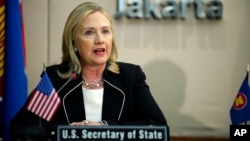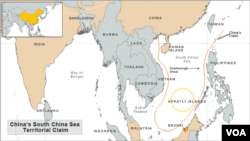BEIJING —
Contested territory in the South China Seas will be at the top of U.S. Secretary of State Hillary Clinton's agenda in her talks with Chinese leaders this week. Ahead of her arrival Tuesday evening, China's Foreign Ministry referred to the conflict as an issue of national sovereignty.
The United States is urging China to hold talks with its neighbors about disputes over the South China Seas. Just hours before Clinton was due to meet with Chinese leaders, China’s Foreign Ministry said the United States should not take a stand on the issue.
Spokesperson Hong Lei told reporters in Beijing that China noticed the U.S. side on many occasions said that it does not take a position on the South China Sea issue. He says China hopes the U.S. will honor its commitment and do more things that will promote regional peace and stability instead of the opposite.
The resource rich waterway is one of the world’s busiest shipping lanes and has been a source conflict among Asian nations. Vietnam, the Philippines, Taiwan, Malaysia and Brunei claim parts of the ocean passage, while Beijing claims nearly the entire sea. Spokesperson Hong Lei says disagreements about the waterway are an issue of territorial sovereignty.
He says different countries have different understandings, concerns and focuses on the issue. He says, as far as China is concerned, the South China Sea issue concerns the territorial sovereignty dispute over some of the Nansha Islands and the overlapping of maritime rights and interests in some parts of the sea. Hong Lei says that, as in other countries in the world, China has the right to maintain its sovereignty and territorial integrity.
Clinton is pushing China to work with its neighbors in the Association of Southeast Asian Nations on a code of conduct for managing disputes in the region. Instead, Beijing has preferred to negotiate bilaterally with each of its neighbors. A Declaration of Conduct for the South China Seas was adopted in 2002, but China and its neighbors failed to agree on a code of conduct at the last summit of the Association of SouthEast Asian Nations in July.
Hong Lei says China believes relevant parties should concretely abide by the pact, promote cooperation and build mutual trust, so as to maintain peace and stability of the South China Sea, instead of magnifying or complicating the issue. While abiding by and implementing the declaration, Hong Lei says the parties concerned can work towards formulating an agreement on the South China Seas. He says China hopes relevant countries will support the consensus and action of relevant ASEAN countries and China and do more things that benefit regional peace and stability.
U.S. Secretary of State Clinton is in the middle of a six-nation, 10-day tour of Asia, months after the Obama administration announced it would pivot attention and U.S. influence away from the Middle East and towards Asia and the Pacific. China’s dispute with Japan about islands in the East China Sea will also top Clinton’s agenda during her visit.
The United States is urging China to hold talks with its neighbors about disputes over the South China Seas. Just hours before Clinton was due to meet with Chinese leaders, China’s Foreign Ministry said the United States should not take a stand on the issue.
Spokesperson Hong Lei told reporters in Beijing that China noticed the U.S. side on many occasions said that it does not take a position on the South China Sea issue. He says China hopes the U.S. will honor its commitment and do more things that will promote regional peace and stability instead of the opposite.
The resource rich waterway is one of the world’s busiest shipping lanes and has been a source conflict among Asian nations. Vietnam, the Philippines, Taiwan, Malaysia and Brunei claim parts of the ocean passage, while Beijing claims nearly the entire sea. Spokesperson Hong Lei says disagreements about the waterway are an issue of territorial sovereignty.
He says different countries have different understandings, concerns and focuses on the issue. He says, as far as China is concerned, the South China Sea issue concerns the territorial sovereignty dispute over some of the Nansha Islands and the overlapping of maritime rights and interests in some parts of the sea. Hong Lei says that, as in other countries in the world, China has the right to maintain its sovereignty and territorial integrity.
Clinton is pushing China to work with its neighbors in the Association of Southeast Asian Nations on a code of conduct for managing disputes in the region. Instead, Beijing has preferred to negotiate bilaterally with each of its neighbors. A Declaration of Conduct for the South China Seas was adopted in 2002, but China and its neighbors failed to agree on a code of conduct at the last summit of the Association of SouthEast Asian Nations in July.
Hong Lei says China believes relevant parties should concretely abide by the pact, promote cooperation and build mutual trust, so as to maintain peace and stability of the South China Sea, instead of magnifying or complicating the issue. While abiding by and implementing the declaration, Hong Lei says the parties concerned can work towards formulating an agreement on the South China Seas. He says China hopes relevant countries will support the consensus and action of relevant ASEAN countries and China and do more things that benefit regional peace and stability.
U.S. Secretary of State Clinton is in the middle of a six-nation, 10-day tour of Asia, months after the Obama administration announced it would pivot attention and U.S. influence away from the Middle East and towards Asia and the Pacific. China’s dispute with Japan about islands in the East China Sea will also top Clinton’s agenda during her visit.





